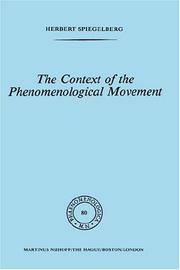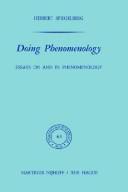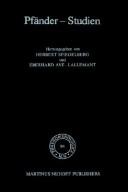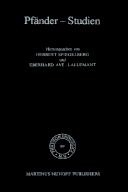| Listing 1 - 8 of 8 |
Sort by
|

ISBN: 9024723922 904818262X 9401732701 9789024723928 Year: 1981 Volume: 80 Publisher: The Hague: Nijhoff,
Abstract | Keywords | Export | Availability | Bookmark
 Loading...
Loading...Choose an application
- Reference Manager
- EndNote
- RefWorks (Direct export to RefWorks)
This is an unashamed collection of studies grown, but not planned before hand, whose belated unity sterns from an unconscious pattern ofwhich I was not aware at the time ofwriting. I call it "unashamed" not only because I have made no effort to patch up this collection by completely new pieces, but also because there seems to me nothing shamefully wrong about following up some loose ends left dangling from my main study of the Phenomenological Movement which I had to cut off from the body of my account in order to preserve its unity and proportion. This disc1aimer does not mean that there is no connection among the pieces he re assembled. They belong together, while not requiring consecutive reading, as attempts to establish common ground 1lnd lines of communication between the Phenomenological Movement and related enterprises in philo sophy. They are not put together arbitrarily, but because ofintrinsic affinities to phenomenology. This does not mean an attempt to blur its edges. But since they are growing edges, any boundaries cannot be drawn sharply without interfering with the phenomena. Nevertheless, in the end the figure of the Phenomenological Movement should stand out more distinctIy as the text against its surrounding context, ofwhich these studies are to provide some ofthe comparative and historical background. This is why I gave to this collection the titIe "The Context ofthe Phenomenological Movement" in contrast to the central "text" as contained in my historical introduction to this movement.
History of philosophy --- anno 1900-1999 --- anno 1800-1899 --- Phenomenology --- Phénoménologie --- Husserl, Edmund, --- 165.62 --- Academic collection --- Fenomenologie --- 165.62 Fenomenologie --- Phénoménologie --- Phenomenology.

ISBN: 9024717256 9401016720 9401016704 9789024717255 Year: 1975 Volume: 63 Publisher: The Hague: Nijhoff,
Abstract | Keywords | Export | Availability | Bookmark
 Loading...
Loading...Choose an application
- Reference Manager
- EndNote
- RefWorks (Direct export to RefWorks)
Substantial encouragement for this volume came from the editors and readers of the Studies for Phenomenological and Existential Philosophy (SPEP) at Northwestern University Press. But its publi cation has been made possible only by the unqualified and un abridged acceptance of the Editorial Board of Phaenomen%gica, which at the time was still headed by its founder, the late Professor H. L. Van Breda, who welcomed the manuscript most generously. This makes his untimely passing even more grievous to me. The stylistic copy editing and proof reading were handled ef ficiently by Ruth Nichols Jackson, secretary of the Philosophy Department. In the proof reading I also had the able help of my colleague Stanley Paulson. I dedicate this book to the memory of my late brother, Dr. chern. Erwin Spiegelberg, at the time of his death assistant professor at the University of Rio de Janeiro, who preceded me by two years in emigrating from Nazi Germany. When in 1938 he put an end to his life in an apparent depression, he also did so in order not to become a burden to his brothers, who were on the point of following him. Whatever I, more privileged in health and in opportunities in the country of my adoption, have been able to do and achieve since then has been done with a sense of a debt to him and of trying to live and work for him too.
Phenomenology --- Phénoménologie --- -Academic collection --- Philosophy, Modern --- Addresses, essays, lectures --- Phenomenology. --- Phénoménologie --- Academic collection
Book
ISBN: 0810103575 9780810103573 Year: 1972 Publisher: Evanston (Ill.): Northwestern university press,
Abstract | Keywords | Export | Availability | Bookmark
 Loading...
Loading...Choose an application
- Reference Manager
- EndNote
- RefWorks (Direct export to RefWorks)
Philosophy --- Psychoanalysis --- Psychology --- Phenomenological psychology --- Psychiatry --- Psychologie phénoménologique --- Psychiatrie --- history --- Medicine and psychology --- Mental health --- Psychology, Pathological --- Psychological phenomenology --- Psychology, Phenomenological --- Existential psychology --- Personality --- Phenomenology --- Psychologie phénoménologique --- Psychoanalysis. --- Psychology. --- history.
Book
Year: 1975 Volume: 62 Publisher: The Hague : M. Nijhoff,
Abstract | Keywords | Export | Availability | Bookmark
 Loading...
Loading...Choose an application
- Reference Manager
- EndNote
- RefWorks (Direct export to RefWorks)
Phenomenology --- Phénoménologie --- Spiegelberg, Herbert --- Bibliography --- Phenomenology.
Book
Year: 1960 Volume: 5-6 Publisher: Hague : Nijhoff,
Abstract | Keywords | Export | Availability | Bookmark
 Loading...
Loading...Choose an application
- Reference Manager
- EndNote
- RefWorks (Direct export to RefWorks)
Phenomenology --- Philosophers --- Phénoménologie --- Philosophes --- Bio-bibliography --- Biobibliographie

ISBN: 9024724902 9400974442 9400974426 9789024724901 Year: 1982 Volume: 84 Publisher: The Hague: Nijhoff,
Abstract | Keywords | Export | Availability | Bookmark
 Loading...
Loading...Choose an application
- Reference Manager
- EndNote
- RefWorks (Direct export to RefWorks)
Die Idee eines selbständigen Bandes von "Pfander-Studien" entstand nach dem Internationalen Kongreß "Die Münchener Phänomenologie", der an läßlich des hundertsten Geburtstags von Alexander Pfander in München stattfand. Ursprünglich war geplant, die im zweiten Teil des Kongresses im Rahmen einer Arbeitstagung über "Das Werk und die Bedeutung Alexander pfänders" gehaltenen Referate, die bereits vervielfältigt waren, nebst Diskussionsberichten in den vorgesehenen Gesamtband über die Konferenz für die Serie Phaenomenologica einzuschlie ßen. Als sich herausstellte, daß der dort verfügbare Raum -für die meisten Beiträge zu knapp bemessen war und nur die abgekürz ten Texte ohne Diskussion hätten aufgenommen werden' können, tauchte die Idee eines gesonderten Bandes auf. Sie führte alsbald zur Erwägung neuer Beiträge und sonstiger Hilfen für das Ver ständnis des alten und neuen Werkes Pfänders. Von den Kon greßbeiträgen war ohnehin der von Karl Schuhmann ftir ein gesondertes selbständiges Buch" Husserl über Pfänder" vorgese hen, das inzwischen in der Reihe Phaenomenologica erschienen ist. 1 Der Beitrag von Peter Schwankl "Alexander pfänders Nachlaßtexte über das virtuell Psychische" erschien im Journal 0/ Phenomenological Psychology. 2 Die beiden einleitenden Refe rate von Schwankl und Spiegel berg über die damals noch unge druckten Nachlaßwerke Philosophie auf phänomenologischer Grundlage und Ethik in kurzer Darstellung konnten nach deren Erscheinen fortbleiben.
Theory of knowledge --- Pfänder, A. --- Phenomenology --- Phénoménologie --- Pfänder, Alexander, --- Pfänder, Alexander, --- Academic collection --- Pfander, Alexander --- Phenomenology. --- Phénoménologie --- Philosophy, Modern --- Pfänder, Alexander, - 1870-1941 --- Pfänder (alexander) --- Phenomenologie --- Critique et interpretation

ISBN: 9024725771 9024723396 9024725356 9400974914 9789024725779 Year: 1982 Volume: 5-6 Publisher: The Hague: Nijhoff,
Abstract | Keywords | Export | Availability | Bookmark
 Loading...
Loading...Choose an application
- Reference Manager
- EndNote
- RefWorks (Direct export to RefWorks)
The present attempt to introduce the general philosophical reader to the Phenomenological Movement by way of its history has itself a history which is pertinent to its objective. It may suitably be opened by the following excerpts from a review which Herbert W. Schneider of Columbia University, the Head of the Division for International Cultural Cooperation, Department of Cultural Activities of Unesco from 1953 to 56, wrote in 1950 from France: The influence of Husserl has revolutionized continental philosophies, not because his philosophy has become dominant, but because any philosophy now seeks to accommodate itself to, and express itself in, phenomenological method. It is the sine qua non of critical respectability. In America, on the contrary, phenomenology is in its infancy. The average American student of philosophy, when he picks up a recent volume of philosophy published on the continent of Europe, must first learn the "tricks" of the phenomenological trade and then translate as best he can the real impon of what is said into the kind of imalysis with which he is familiar . . . . No doubt, American education will graduaUy take account of the spread of phenomenological method and terminology, but until it does, American readers of European philosophy have a severe handicap; and this applies not only to existentialism but to almost all current philosophical literature. ' These sentences clearly implied a challenge, if not a mandate, to all those who by background and interpretive ability were in a position to meet it.
165.62 --- Academic collection --- 165.62 Fenomenologie --- Fenomenologie --- History of philosophy --- anno 1900-1999 --- anno 1800-1899 --- Phenomenology --- Phénoménologie --- History --- Histoire --- History.
Book
Abstract | Keywords | Export | Availability | Bookmark
 Loading...
Loading...Choose an application
- Reference Manager
- EndNote
- RefWorks (Direct export to RefWorks)
Phenomenology --- Ethics --- Phénoménologie --- Morale
| Listing 1 - 8 of 8 |
Sort by
|

 Search
Search Feedback
Feedback About UniCat
About UniCat  Help
Help News
News